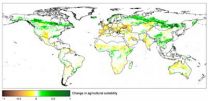(Press-News.org) Our genetic information is stored in DNA, tiny strands of nucleic acid that contain instructions for the functioning of our bodies. To express this genetic data, our DNA is copied into RNA molecules, which then translate the instructions into proteins that perform tasks in our cells.
Several years ago, scientists discovered a new type of RNA molecule. Unlike all other known RNAs, this molecule is circular, and was labeled circular RNA. Although circRNA molecules are abundant, little has been known about how they are produced. Moreover, little has been known about the role they play in our biology, and next to nothing has been known about the role they play in disease.
Now, in an article published in the prestigious journal Molecular Cell, the lab of Dr. Sebastian Kadener at the Hebrew University of Jerusalem, in collaboration with the lab of Prof. Nikolaus Rajewsky at the Max Dellbruck Institute in Berlin, has discovered how circRNAs are produced.
Kadener and his colleagues found that circRNAs not only compete with normal RNAs, but the body actually produces them at the expense of normal RNA. Therefore, the mere fact of circRNAs' production has an enormous impact on how our genes are expressed, which affects how our bodies develop and function.
The researchers also demonstrated that circular RNA molecules are highly produced in the brain, and in many cases from genes with very important functions. This strongly suggests that circRNAs play an important role in brain function — and likely in brain disease.
In addition, Dr. Kadener and colleagues identified the protein "muscleblind" as a factor involved in circRNA biogenesis, and showed that muscleblind can enhance and regulate the production of a subset of circular RNAs.
Importantly, defects in muscleblind function are known to cause a severe degenerative disease called myotonic dystrophy. Characterized by progressive muscle wasting and weakness, this is the most common form of muscular dystrophy that begins in adulthood. When considered together, the important role played by muscleblind in regulating circRNAs, combined with these molecules' abundance in the brain, suggests that circRNAs might be involved in development of myotonic dystrophy.
According to Dr. Kadener, "This research is significant from several perspectives. By mapping how circRNAs are produced, it helps advance our understanding of general molecular biology. In addition, it might be strongly relevant for understanding and eventually treating degenerative diseases both in muscle and the brain."
INFORMATION:
The work is a collaboration between Dr. Kadener's lab and Prof. Nikolaus Rajewsky from the Max Dellbruck Institute, Berlin, Germany. Authors of the work are: Dr. Reut Ashwal-Fluss, Mr. Nagarjuna Reddy Pamadurti, Dr. Osnat Bartok, Mrs. Mor Hanan and Naveh Evantal (Dr. Kadener's lab); and Markus Meyer, Andranik Ivanov and Sebastian Meczmack (Prof. Rajewsky's lab).
The research is published in Molecular Cell as "CircRNA biogenesis competes with pre-mRNA splicing." Kadener's group was supported by the European Research Council (ERC), a Human Frontiers Science Career (HFSP) development award, and the Israel Science Foundation.
Scientists find how mysterious 'circular RNA' is formed, claim muscular dystrophy link
Research could help eventual treatment of degenerative muscle and brain diseases
2014-09-18
ELSE PRESS RELEASES FROM THIS DATE:
Flu vaccine for expectant moms a top priority
2014-09-18
WHITE PLAINS, NY, SEPT. 18, 2014 -- Only about half of all pregnant women in the U.S. get a flu shot each season, leaving thousands of moms-to-be and their babies at increased risk of serious illness.
"Getting a flu shot should be a routine part of prenatal care," said Edward McCabe, MD, March of Dimes chief medical officer. "Health care providers should offer their pregnant patients a flu shot each year and if they don't, then women should ask for it."
A report by the U.S. Centers for Disease Control and prevention presented today by the National Foundation for ...
New high-resolution satellite image analysis: 5 of 6 Syrian World Heritage sites 'exhibit significant damage'
2014-09-18
SEPTEMBER 18 —In war-torn Syria, five of six World Heritage sites now "exhibit significant damage" and some structures have been "reduced to rubble," according to new high-resolution satellite image analysis by the nonprofit, nonpartisan American Association for the Advancement of Science (AAAS).
The AAAS analysis, offering the first comprehensive look at the extent of damage to Syria's priceless cultural heritage sites, was completed in partnership with the University of Pennsylvania Museum of Archaeology and Anthropology's Penn Cultural Heritage Center (PennCHC) and ...
NASA marks Polo for a hurricane
2014-09-18
Hurricane Polo still appears rounded in imagery from NOAA's GOES-West satellite, but forecasters at the National Hurricane Center expect that to change.
NOAA's GOES-West satellite captured data on Hurricane Polo on Sept. 18 at 10:15 a.m. EDT. An image using that data was created by the NASA/NOAA GOES Project at NASA's Goddard Space Flight Center in Greenbelt, Maryland. The image showed thunderstorms wrapping tightly around the center of the storm while one broken band of thunderstorms extended to the northwest, while the other appeared on the eastern side of the center ...
New Dartmouth smartphone app reveals users' mental health, performance, behavior
2014-09-18
Dartmouth researchers and their colleagues have built the first smartphone app that automatically reveals students' mental health, academic performance and behavioral trends. In other words, your smartphone knows your state of mind -- even if you don't -- and how that affects you.
The StudentLife app, which compares students' happiness, stress, depression and loneliness to their academic performance, also may be used in the general population – for example, to monitor mental health, trigger intervention and improve productivity in workplace employees.
"The StudentLife ...
Fall foliage season may be later, but longer on warmer Earth
2014-09-18
The fall foliage season that prompts millions of Americans to undertake jaunts into the countryside each year could come much later and possibly last a little longer within a century, according to new research.
Climate change could postpone fall leaf peeping in some areas of the United States as summer temperatures linger later into the year, Princeton University researchers report in the journal Global Ecology and Biogeography. For instance, the paper birch — a popular foliage tree that is the state tree of New Hampshire — could change color one to three weeks later ...
Want to link genes to complex traits? Start with more diversity
2014-09-18
Life is rarely simple. From crop yields to disease risks, the biological characteristics people care most about are usually those considered "complex traits." Just as for height—the textbook example of a complex trait—attributes like risk for a particular human disease are shaped by multiple genetic and environmental influences, making it challenging to find the genes involved. To track down such genes, geneticists typically mate two individuals that differ in key ways—for example, a large mouse and a small mouse—and then study their descendents, looking for genes that ...
Americans rate losing eyesight as having greatest impact on their lives
2014-09-18
ALEXANDRIA, Va.—Sept. 18, 2014—Many Americans across racial and ethnic groups describe losing eyesight as potentially having the greatest impact on their day-to-day life, more so than other conditions including: loss of limb, memory, hearing and speech (57% of African-Americans, 49% of non-Hispanic whites, 43% of Asians and 38% of Hispanics). When asked which disease or ailment is the worst that could happen to them, blindness ranked first among African-Americans followed by AIDS/HIV. Hispanics and Asians ranked cancer first and blindness second, while Alzheimer's disease ...
Living in a disadvantaged neighborhood worsens musculoskeletal pain outcomes after trauma
2014-09-18
CHAPEL HILL, N.C. – Individuals living in disadvantaged neighborhoods have worse musculoskeletal pain outcomes over time after stressful events such as motor vehicle collision than individuals from higher socioeconomic status neighborhoods, even after accounting for individual characteristics such as age, sex, income, education, and employment status.
These were the findings of a multi-site research study led by Samuel McLean, MD, MPH, associate professor of anesthesiology and emergency medicine at the University of North Carolina School of Medicine. The results of the ...
Global agriculture: More land, fewer harvests
2014-09-18
According to a simulation of the impact of climate change on agricultural production over the course of the 21st century, carried out by researchers led by Professor Wolfram Mauser at LMU's Department of Geography, some two-thirds of all land potentially suitable for agricultural use is already under cultivation. The study indicates that climate change will expand the supply of cropland in the high latitudes of the Northern hemisphere (Canada, Russia, China) over the next 100 years. However, in the absence of adaptation measures such as increased irrigation, the simulation ...
Withdrawal from the evolutionary race
2014-09-18
This news release is available in German. In ecology, disease tolerance is defined as a host strategy not to fight a pathogen tooth and nail, but rather tolerate it to live (and survive) better in the long term. One key feature of tolerance is that the disease only progresses very slowly – if at all – even if the host carries a high pathogen load.
Roland Regoes, a senior scientist at ETH Zurich's Institute of Theoretical Biology, has now transferred this approach to HIV. He set about investigating whether there are infected people who are more tolerant of the HI virus ...
LAST 30 PRESS RELEASES:
Scientists show how to predict world’s deadly scorpion hotspots
ASU researchers to lead AAAS panel on water insecurity in the United States
ASU professor Anne Stone to present at AAAS Conference in Phoenix on ancient origins of modern disease
Proposals for exploring viruses and skin as the next experimental quantum frontiers share US$30,000 science award
ASU researchers showcase scalable tech solutions for older adults living alone with cognitive decline at AAAS 2026
Scientists identify smooth regional trends in fruit fly survival strategies
Antipathy toward snakes? Your parents likely talked you into that at an early age
Sylvester Cancer Tip Sheet for Feb. 2026
Online exposure to medical misinformation concentrated among older adults
Telehealth improves access to genetic services for adult survivors of childhood cancers
Outdated mortality benchmarks risk missing early signs of famine and delay recognizing mass starvation
Newly discovered bacterium converts carbon dioxide into chemicals using electricity
Flipping and reversing mini-proteins could improve disease treatment
Scientists reveal major hidden source of atmospheric nitrogen pollution in fragile lake basin
Biochar emerges as a powerful tool for soil carbon neutrality and climate mitigation
Tiny cell messengers show big promise for safer protein and gene delivery
AMS releases statement regarding the decision to rescind EPA’s 2009 Endangerment Finding
Parents’ alcohol and drug use influences their children’s consumption, research shows
Modular assembly of chiral nitrogen-bridged rings achieved by palladium-catalyzed diastereoselective and enantioselective cascade cyclization reactions
Promoting civic engagement
AMS Science Preview: Hurricane slowdown, school snow days
Deforestation in the Amazon raises the surface temperature by 3 °C during the dry season
Model more accurately maps the impact of frost on corn crops
How did humans develop sharp vision? Lab-grown retinas show likely answer
Sour grapes? Taste, experience of sour foods depends on individual consumer
At AAAS, professor Krystal Tsosie argues the future of science must be Indigenous-led
From the lab to the living room: Decoding Parkinson’s patients movements in the real world
Research advances in porous materials, as highlighted in the 2025 Nobel Prize in Chemistry
Sally C. Morton, executive vice president of ASU Knowledge Enterprise, presents a bold and practical framework for moving research from discovery to real-world impact
Biochemical parameters in patients with diabetic nephropathy versus individuals with diabetes alone, non-diabetic nephropathy, and healthy controls
[Press-News.org] Scientists find how mysterious 'circular RNA' is formed, claim muscular dystrophy linkResearch could help eventual treatment of degenerative muscle and brain diseases




